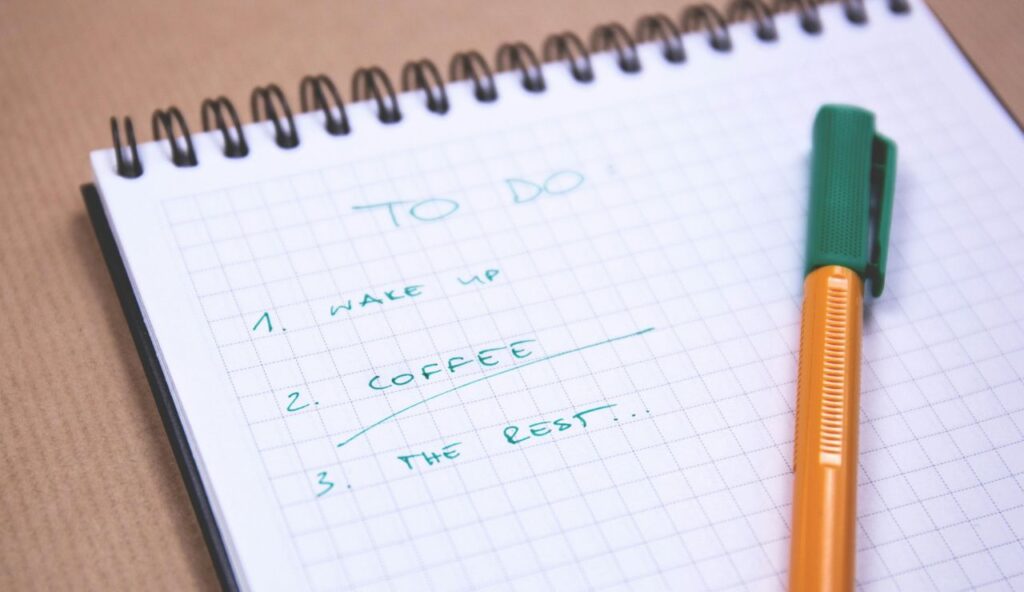A packed schedule can leave your mind scattered and your mood tense. But the right routines can help bring focus without draining your energy. It’s not about being perfect or productive every hour. It’s about creating small habits that steady your thoughts and make your day feel more manageable. These daily routines are easy to follow and help you stay clear-headed and calm.
1. Start Your Morning Without Your Phone

Grabbing your phone first thing floods your brain with messages, news, and noise. Taking ten minutes to stretch, drink water, or just sit quietly helps you ease into the day. Your mind wakes up more clearly when it is not immediately overwhelmed. This small shift gives your focus a stronger start and creates a calmer rhythm for the rest of your morning.
2. Make a Quick To-Do List

Having a simple list of what needs to be done keeps your day from feeling chaotic. It does not have to be detailed, just a few clear goals written down. This helps your brain stop juggling everything at once. Each time you check something off, you build momentum. A short list brings direction without added pressure and turns your day into something more manageable.
3. Schedule a Quiet Reset Moment

Even a five-minute break can make a big difference. Pick a consistent time in your day to pause without screens or conversation, just stillness. You might sit outside, close your eyes, or take slow breaths. This gives your brain space to recharge and refocus. It is a mental reset that helps you stay steady when the day becomes overwhelming or your thoughts feel scattered.
4. Eat One Meal Without Multitasking

Meals often become background to texting, scrolling, or studying. Choose one time a day to eat without distractions. You notice your food more, breathe more deeply, and allow your mind to slow down. It may seem small, but this moment of presence can help you regain calm and improve focus. It is one of the simplest ways to reset your energy mid-day.
5. Move Your Body for Ten Minutes

You do not need a full workout to feel better. Walking around your room, dancing to a song, or stretching your arms and legs can lift your energy fast. Movement tells your brain to stay alert and helps clear mental fog. When your body is in motion, your thoughts often follow. Just a few minutes of activity can reset your mood and help you return to tasks with clearer focus.
6. Choose a Consistent Sleep Time

Sleep schedules often shift, especially with school, homework, or screen time. Choosing one bedtime and sticking to it most nights helps your body and brain stay balanced. Falling asleep at the same time teaches your mind to wind down naturally. This leads to deeper rest, better memory, and improved focus the next day, even if waking up early still feels challenging.
7. Prep for Tomorrow the Night Before

Setting out your clothes, packing your bag, or writing a quick list of tomorrow’s goals can lower morning stress. When your next day feels more organized, your mind can rest easier at night. It also saves time and effort the following morning. This small routine gives you a sense of control and helps you begin the day feeling prepared rather than rushed or distracted.
8. Drink Water First, Caffeine Later

Your brain relies on hydration to stay sharp. Drinking water before coffee or soda wakes your body up more gently. It supports energy and attention without the quick spikes or crashes that come from caffeine. Making this your first step in the morning helps you listen to your body’s needs and creates a steady base for clearer thinking throughout the day.
9. Keep Your Space Tidy Once a Day

Clutter makes it harder to think clearly. Taking a few minutes to straighten up your space, such as making your bed or clearing a surface, creates a calmer environment. You do not need to deep-clean anything. Just a little order can reduce distractions and give your brain a cleaner starting point. It helps you stay focused and more relaxed in your space.
10. Set One Screen-Free Hour

Screens are helpful but often divide your attention. Choosing one hour a day without a phone, tablet, or TV allows your mind to reset. Use the time to read, write, or do something hands-on. Without constant digital input, your thoughts slow down and refocus naturally. This habit helps you feel more in control and adds calm to your daily rhythm.
11. Use Music to Create Focus Blocks

Certain music helps signal that it is time to concentrate. Whether it is instrumental tracks or soft beats, using the same type of music for reading or studying teaches your brain to settle in. Over time, your mind starts to connect that sound with focus. It becomes a useful tool that makes it easier to begin and stay with tasks, even when distractions are tempting.
12. Stretch Right After Waking Up

Morning stiffness can quietly affect your mood and energy. A short stretch after waking helps blood flow and loosens your muscles. You do not need a full routine. Just reaching upward, rolling your shoulders, or bending forward brings results. This gentle activity signals your body to wake up and prepares your mind for the day. It adds focus and calm without much effort.


